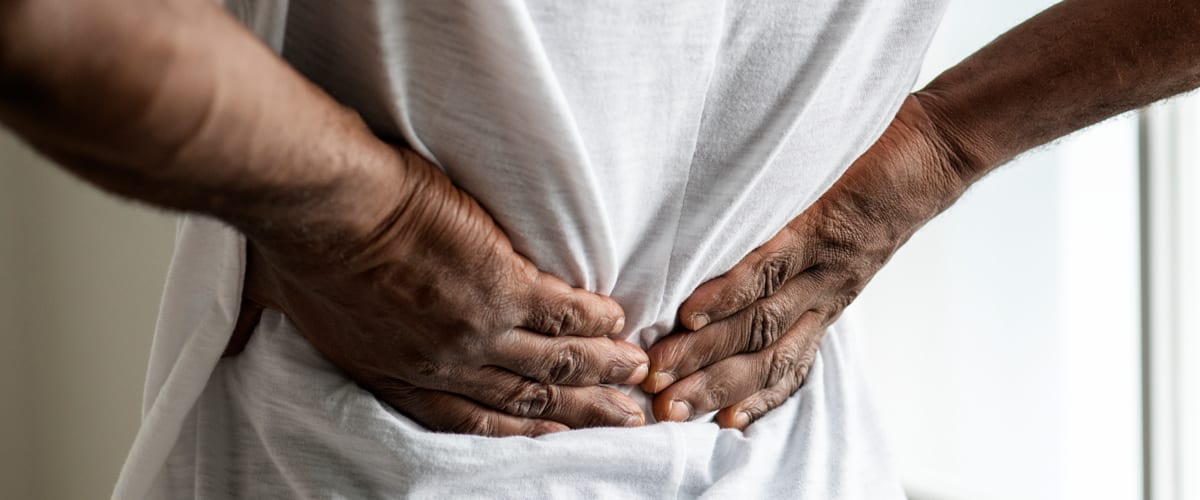Doctor-Approved Tips to Prevent Back Pain
Spinal disorders affect scores of Americans. Follow these tips to protect your back.


Scores of Americans suffer from spinal disorders such as back pain, neck pain, scoliosis, stenosis, and disc disease, all which can cause debilitating sleep issues and affect one’s everyday activities. Back pain alone is one of the most common reasons Americans call in sick to work, with total costs in the United States exceeding $100 billion annually.
“Back and neck pain are common and may resolve on their own,” says Dr. Peter Angevine, a spine neurosurgeon with Och Spine at NewYork-Presbyterian. “They can be severe, however, and disrupt daily life. Fortunately, reducing chances of severe or chronic pain can involve some relatively simple interventions.”
Make Movement Part Of Your Daily Routine
Regular cardiovascular exercise and stretching and strengthening exercises can increase back and abdomen flexibility, according to Drs. Angevine, Lawrence Lenke, Ronald Lehman Jr., K. Daniel Riew of Och Spine at NewYork-Presbyterian, who provided back health tips to Health Matters.
“Maintaining a strong core helps promote neutral pelvic alignment and can help to reduce low back pain,” says Dr. Angevine.
It’s also important to get up and walk around every 15 to 30 minutes if you sit for long periods. Maintaining a healthy body weight and avoiding smoking will make adopting these habits easier.
Maintain Proper Posture
Posture is also key in maintaining back health. In addition to being aware of slouching or holding your head too far forward while sitting, the doctors recommend sitting with the feet supported, the hips level with or slightly above the knees, the spine slightly reclined, and a small arch in the lower back maintained.
If sitting at a computer, the shoulders should be relaxed and away from the ears, the elbows bent to about 90 degrees and resting by the sides, the wrists neutral (not bent up, down, or away from each other), and the head facing front without protruding forward.
If using a mobile phone or tablet for texting or web browsing, hold it up instead of bending your neck to look down, the doctors say. The more you look down at a mobile phone or tablet, the more the muscles have to work to keep your head up, which can lead to strain. At just 45 degrees, your neck muscles are doing the work of lifting a 50-pound bag of potatoes, the doctors say.
“When possible put devices at eye level,” says Dr. Angevine.
Lift Heavy Objects Properly
When lifting a heavy or large object, make sure it is properly balanced and packed correctly so its weight won’t shift. Keep the object close to your body and take your time lifting since rushing will strain your muscles. When you are ready to lift, bend at the hips and knees, not the lower back. Maintain proper posture with your back straight and head up, and use your legs to lift.
For those with complex spinal problems such as scoliosis, myelopathy, neck or low back nerve impingement, chronic sciatica, stenosis, or vertebral fractures, surgeons from Och Spine at NewYork-Presbyterian recommend getting an immediate medical assessment. Individuals who have back injuries due to severe trauma also are advised to seek professional medical help.
Pay Attention To Symptoms
Indications that a serious injury has occurred include abnormal bowel or bladder function, bilateral sciatica (pain down both legs), significant nocturnal pain, weight loss, fever, and severe pain. Symptoms such as loss of balance or dexterity, constant numbness, or weakness could also indicate neurological issues. In these cases, patients are referred for a diagnostic workup that may include X-ray, MRI, and CT scan. After a diagnosis, treatment can include physical therapy, complementary medicine (acupuncture, magnetic therapy, herbal medications, and more) and surgery for serious conditions.
“For more complicated spinal problems such as scoliosis, stenosis, fractures, or injuries from trauma, medical intervention is usually necessary for effective treatment,” says Dr. Lenke, co-director of Och Spine at NewYork-Presbyterian and surgeon-in-chief at the Och Spine Hospital. “But each person with or without spinal problems can benefit from adopting healthier lifestyle habits to keep your spine as strong as possible.”
To learn more about spine care at Och Spine at NewYork-Presbyterian, visit nyp.org/ochspine

